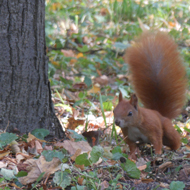
Survey find no traces of deadly disease
Around the UK red squirrels are under threat – but on a Scottish island, scientists have found that they are thriving.
Scientists and veterinarians from the University of Edinburgh's Royal (Dick) School of Veterinary Studies have carried out a survey of red squirrels living on the Isle of Arran.
Experts have monitored their heath in a bid to try to help save the species, which has been under threat both from deadly diseases and competition for food and habitat from the grey squirrel, introduced to Britain from North America in the 19th century.
The Isle of Arran is just one of 19 red squirrel strongholds in Scotland. There are no grey squirrels on the island, and scientists found the red squirrels to be in excellent heath.
In particular, they were pleased to discover no evidence of the deadly squirrel pox virus.
The team humanely trapped and examined 21 live squirrels last summer with the help of local foresters and rangers. They also examined the remains of 16 squirrels that had been killed on the roads.
Health checks included tests for common squirrel diseases, such as parasites and viruses. They also investigated the genetics of the animals.
Prof Anna Meredith of the Royal (Dick) School of Veterinary Studies, who worked on the survey, said: “Some populations of red squirrels have been found to have high levels of diseases, and lack of genetic diversity could also affect their health, so we’re delighted to find that Arran’s red squirrels are fit and healthy.”
The survey was funded by the People’s Trust for Endangered Species and Forestry Commission Scotland.
Image by Peter Lurz



 The Greyhound Board of Great Britain has published new vaccination guidance, with all greyhounds registered from 1 January, 2027 required to have the L4 leptospirosis vaccination, rather than L2.
The Greyhound Board of Great Britain has published new vaccination guidance, with all greyhounds registered from 1 January, 2027 required to have the L4 leptospirosis vaccination, rather than L2.